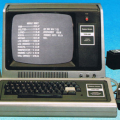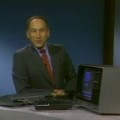More About BASIC Over Shortwave
I recently wrote about a September 1981 Radio Netherlands experiment to broadcast BASIC programs over shortwave. The concept of broadcasting BASIC programs over radio wasn’t new to Holland. The Hobbyscoop program, which aired on NOS (a Dutch domestic broadcaster), regularly broadcast BASIC programs over mediumwave (more commonly called AM in the United States). But this was the first time such a broadcast was attempted on shortwave.
The experiment was conducted as part of the Media Network program, which aired Thursdays on Radio Netherlands. As a long-time listener to Media Network (although not at that time), I was curious about the experiment and the results. Jonathan Marks, the host and producer of Media Network, was kind enough to provide me with more details about the test:
For some computers, like the TRS-80, we got some good results (47% success) for the first hop. But two things were working against us.
- Optimod, the signal processing system at the transmitter site had to be switched off.
- Propagation….after the first hop, the reliability dropped off to around 5% success.
So we dropped the shortwave, but helped the Hobbyscoop programme on the NOS to put programs out on mediumwave 747. That worked perfectly for many years.
I was surprised by the 47% success rate and asked him if it was lower for other types of computers. He responded:
The program we transmitted over shortwave was pretty simple — and we promoted it as an experiment. In those days the Optimod was in the basement at Radio Netherlands, so during the Thursday broadcast, we literally bypassed the unit for a few minutes, particularly on the 1130 UTC broadcast to Europe. As we suspected, no-one got results via Bonaire and Madagascar because the audio signal to those transmitter sites was split over two phone lines and then recombined. That phase shift made the data useless.
My thanks to Jonathan Marks for answering my questions.
If you want to know more about Hobbyscoop, here’s a page about it and the BASICODE format that it used: BASICODE: an example of Dutch computer folklore











